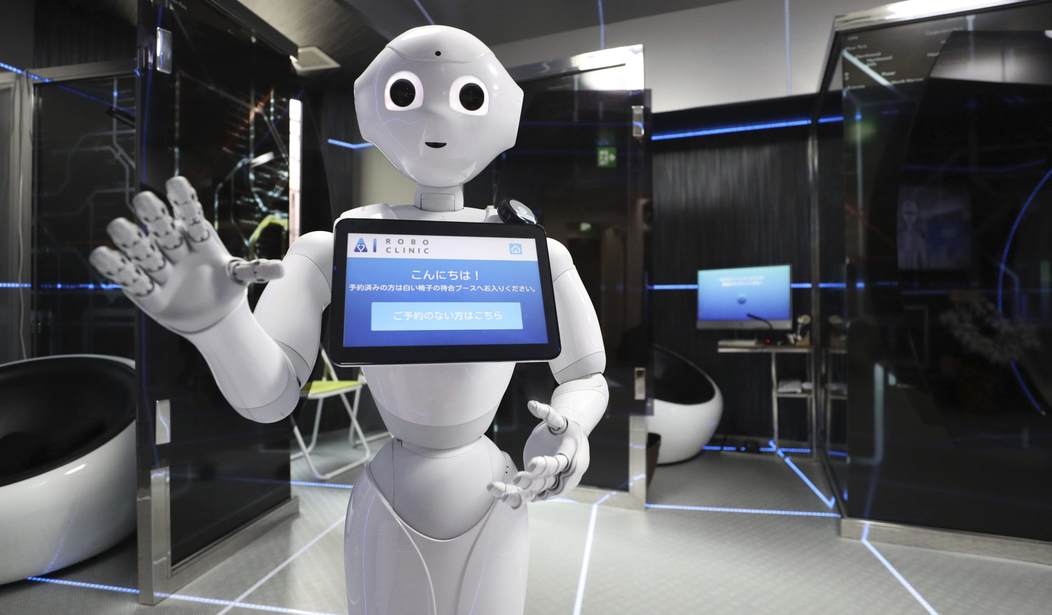More than a few people have their knickers in a twist over artificial intelligence (AI). But they shouldn’t. The technology will make us all richer.
Some folks fear AI to the point where they get paralyzed, whereas the reality is that this new technology will augur consistent pay raises. Here’s the skinny on a situation that shouldn’t be at all terrifying, but is.
Scared sick
That dread of newfangled automation is making people sick, according to new research. A recent study from the journal Social Science and Medicine found that as the risks of job automation increased the mental and physical health of the population declined. The study, “County-level job automation risk and health: Evidence from the United States,” was conducted as the title suggests using data sourced at the county level.
In other words, as the risks of a machine taking your job increase then your mental and physical health decline. However, the authors from Villanova University and Ball State University say, readers should approach the results with caution because there are a slew of other factors involved that might change the results.
Still, debilitating and health-threatening fear is what we should expect given the combined effects of media-led hysteria about robots eliminating all jobs forever.
That prolonged periods of extreme anxiety and fear make people sick shouldn’t surprise anyone. Cassandras who preach imminent doom in the jobs market won’t help pep up anyone, either. Perhaps a dose of reality will work.
Jobs extinction ahead? Hardly.
The problem is that forecasted doom and gloom is likely not an accurate picture of the future. Technological change has never permanently meant permanent mass unemployment. Mostly it has ushered in better-paid jobs of the type never before imagined.
Let’s start with new technology eliminating jobs. Before the industrial revolution, which began in Britain in the 1700s, almost all work was agricultural, and harvesting was done manually, often with scythes. These days crops such as corn and wheat are primarily mechanically harvested, and in the developed world a tiny percentage of the population works the land.
Despite the destruction of agricultural jobs, we are not all unemployed. New jobs got created of the type which the men and women of yore could never have imagined. Consider how you would describe an aerospace mechanic’s job to laborers from 1650, 1750 or 1850. With difficulty, no doubt, and the farmworker would be incredulous.
We have the same situation now. Many jobs will disappear. We don’t yet know what new roles will appear.
Consider recent history. When the now-obsolete fax machine became popular in the late 1980s, then operators of telex machines, which performed a fax-machine-like function, were instantly redundant.
Likewise, airport check-in no longer means individual attention from airline staff. “I just printed my own boarding passes and even checked my own bag through,” says Robert Wright, professor of political economy at Augustana University in Sioux Falls. “There was an employee there to help out the old or clueless, but she was handling I’m guessing five times as many passengers as the old-fashioned way.” In other words, the new check-in technology allows more worker efficiency.
The big thing here is that machines raise worker productivity, and that is the route to sustained increases in wages. In fact, you can’t have inflation-adjusted wages rising consistently unless the workers increase their output as well. If you doubt this, consider the following. If you raise salaries faster than the rate of inflation without a jump in productivity, then inflation-adjusted profits must fall.
Because most people are now working at or near their limit they can’t work harder; they must instead work more efficiently. Newer and better machines, including AI, help achieve that.
Unskilled do better
All workers get better pay in a local geographic area when a company improves its productivity, according to a recent study by brainiacs at the University of Chicago and the University of California at Berkeley. Perhaps more interesting is that the people who benefit most from the gains in output are the least-skilled workers.
The study “Who Benefits from Productivity Growth?” finds that a jump in business productivity will raise wages of local workers. This helps those people with the least developed skills more than highly skilled ones. The reason is simple: “[…] less-skilled workers are less mobile,” states the report. Put simply, the in-demand workers who have specialized know-how employers can quickly move location. Those without cannot.
At its most basic level, new technology shouldn’t be terrifying people who think they’ll become obsolete, but rather they should be welcoming it with open arms.









Join the conversation as a VIP Member